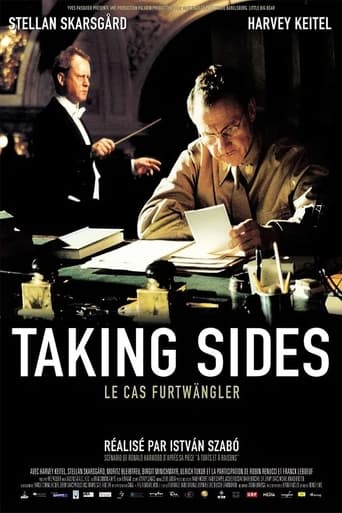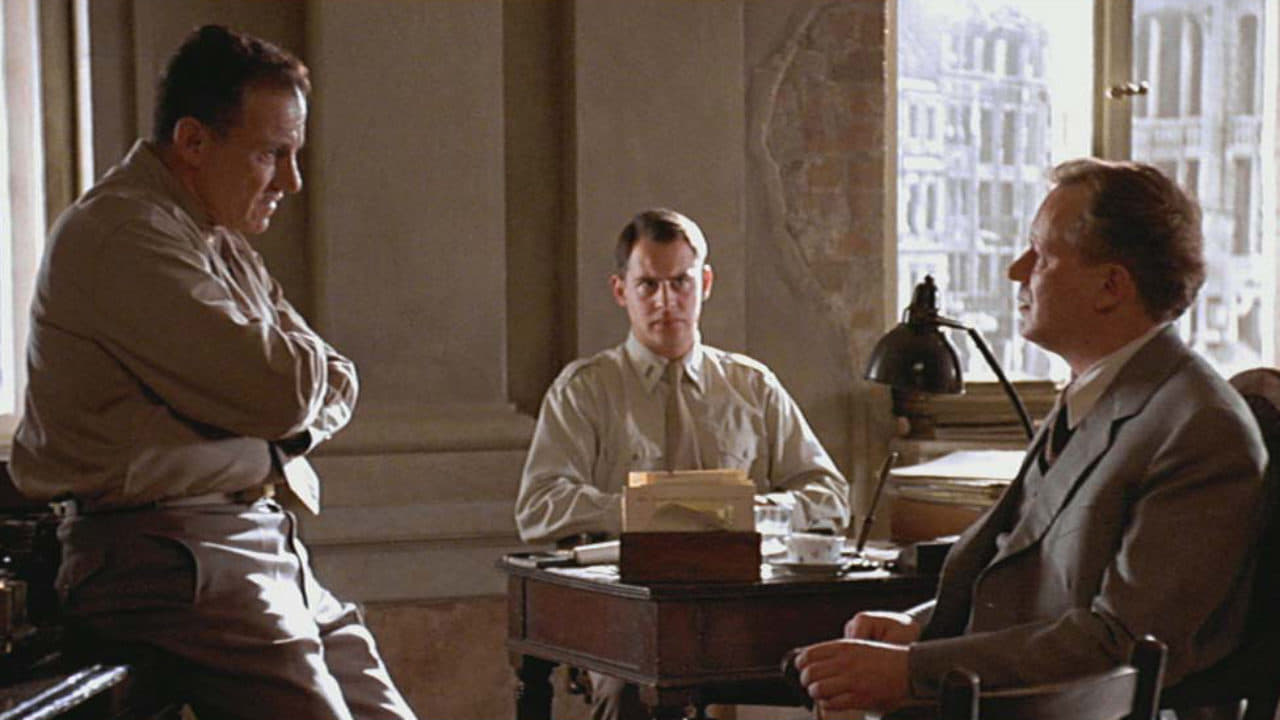dusan-22
As for this film, I was only impressed by the fact that Hollywood still makes its propaganda pieces made with Frank Capra style, even though amazed by Harvey Keitels and Stellan Skarsgård's acting, beautiful as always. I can tell the same on the following roles of Moritz Bleibtreu and Birgit Minichmayr, fantastic acting talents. I believe that Istvan Sabo made a truly well developed theater piece screened for all times. Harvey's and Stellan's monologues are just cream on the whole post war cake served, whatever taste is. What really went beyond control if you ask me is American feature film voice and picture of God, judge and jury represented so well by Harvey Keitel. Most monstrous hypocrisy served by the state film policy, whose country didn't even liberate Europe from the Nazis but just came to get their political piece of cake (almost) after the Soviet triumph, is sooo pathetic. The worse is when the mass murder come to judge the serial killer and then find his brother to play the law with him once the serial killer is eliminated by someone else. I guess everybody has to play their roles. Citizens of the country whose ancestors exterminated over 80 million native Americans just to get their land is judging Nazi Germany for exterminating 6 million Jews that were left to die until the interest didn't move their troops to Europe. Officer of the country that killed over 6 million civilians only in Vietnam and Korean war together talks about responsibility of an artist? What about the responsibility of John Wayne, glorified figure of the greatest civilian massacre in human history? What about Barry Sadler and Merle Haggard the hippie hater whose music was encouraging US boys to throw napalm over Vietnamese women and children? Is napalm better than gas chambers of the Nazis? And what about "Birth of Nation" and D.W. Griffith? Isn't he the one of the greatest establishers of American feature film? D.W. Griffith the clan's man ... Well, examples are many, many of them probably worse than the poor attempt to make a plot for this film as nobody ever trialled these people and on contrary - they have been glorified until today. Pity for wasted talent. I will be what an art lover suppose to be when faces tyranny of evil according to this movie and will disregard positive vote. 0 out of 10.
annesmith56
Major Steve Arnold tells his assistant in one of the bar room scenes to "Grow Up - F----n Grow up", the time has long since passed for equivocation on the Furtwenglers of this world. Notwithstanding the merits or demerits of the film in cinematic terms, these I believe are the most telling words of the entire debate. What if all the singer songwriters who opposed the Vietnam war had wrung their hands in anguish wondering what the right thing to do was? When all the while the draft lottery was proceeding apace. When the noble conductor was wiping his hands at the end perhaps he was trying to wipe away his guilty conscience. There is a time when black and white logic, clear thinking and action are necessary, not the murky greyness of moral duplicity. As Nero fiddled, Rome burned. As Furtwengler conducted - the people in the gas chambers were squealing to accompaniment of the violins in Berlin!
James Hitchcock
In 1946, Wilhelm Furtwängler, one of Germany's greatest musicians and the conductor of the Berlin Philharmonic, was put on trial before a denazification tribunal, even though he was a member of neither the German government nor the Wehrmacht. He was not accused of war crimes; indeed, he was not accused of any crimes in the normal meaning of the term. He was never a member of the Nazi Party, made little secret of his dislike for them and always refused to give the Nazi salute. He assisted several Jewish musicians to leave the country. The Allied authorities, however, were well aware of the symbolic importance of culture, especially music, in German life, and were determined to land a "big fish". Furtwängler was charged with supporting Nazism by remaining in Germany, performing at Nazi party functions and with making anti-Semitic remarks.Furtwängler was eventually cleared of all these charges and allowed to resume his musical career, but even so he still remained suspect in many people's eyes. He was not, for example, allowed to conduct in America after the war. To me this has always seemed unfair given that there were other eminent musicians who were enthusiastic Nazis, such as his younger rival Herbert von Karajan, who actually joined the Nazi Party in his native Austria in 1933, at a time when that party was looked on with extreme disfavour by the country's authoritarian but anti-Nazi government. Even Arturo Toscanini, hailed as an anti-Fascist hero after he left Italy in 1931, was himself once a Fascist who in 1919 stood (unsuccessfully) as one of the party's parliamentary candidates.Istvan Szabo also directed "Mephisto", another film about an artist (in that case an actor) who compromises with the Nazis in order to continue working in Germany. The theme may have some personal relevance for Szabo himself, as he worked in Hungary under the Communist regime. "Taking Sides", based upon Ronald Harwood's stage play, imagines Furtwängler's pre-trial interrogation by Major Steve Arnold, an American officer. Most of the film takes place in Arnold's office, an appropriately claustrophobic setting which perhaps betrays its origins in the theatre, although we also see shots of the ruins of Berlin outside. There is one very effective scene of a classical concert taking place in a ruined church.Arnold is in many ways unsuitable for the task to which he has been assigned. He is a philistine, ignorant of classical music. He refers to Furtwängler as a "bandleader" and, when asked which is his favourite Beethoven symphony, replies "the eleventh". Upon being told that Beethoven only wrote nine he claims (unconvincingly) to have been joking. In civilian life he was an insurance investigator, and he has some similarities to the cynical character played by Edward G Robinson in "Double Indemnity", who automatically suspects all insurance claims of being fraudulent. (That film is briefly mentioned here). Arnold takes a strong dislike to Furtwängler, whom he suspects of being a fraud and a hypocrite, and bullies him mercilessly.Furtwängler, however, does have three surprising allies, all of whom have perhaps more cause to hate the Nazis than Arnold does, Arnold's Russian counterpart Colonel Dymshitz, his young assistant Corporal David Wills (ne Weill), a German Jew forced to flee to the US from the Nazis, and his German secretary Emmi whose father was executed for his part in the plot to overthrow Hitler. Dymshitz, unlike Arnold, is a music lover; although he has seen his homeland devastated by the Nazi invasion, he has lived under Stalin and therefore understands the compromises that need to be made with a totalitarian regime. Wills and Emmi take objection to Arnold's bullying of Furtwängler, which remind them of Gestapo interrogation tactics.There are two excellent performances in the leading roles. Stellan Skarsgard's Furtwängler is a saddened, disillusioned man, who has realised too late the evil of which his political masters were capable. Yet he defends his decision to remain in Germany as a champion of the humane, enlightened values of high culture, at a time when those values were under attack like never before, to continue playing the music of Beethoven, Mozart and Schubert at a time when the German people most sorely needed to hear it.Harvey Keitel's Arnold is a classic example of the little man given too much power. Perhaps this type was best described by Shakespeare in "Measure for Measure", the man "dressed in a little brief authority" who "like an angry ape plays such fantastic tricks before high heaven as make the angels weep". Some have complained that Harwood, Szabo and Keitel load the dice in Furtwängler's favour by making Arnold too unpleasant. Had he been less obnoxious his debating points might have carried more weight; as it is, his references to Auschwitz and Buchenwald seem no more than tasteless attempts to use the tragedy of the Holocaust to justify his own arrogance and ruthlessness.In my view, however, the film does more than examine the moral complexities of Furtwängler's position. It also explores the moral complexities of the Allied position. The ruins of Berlin remind us of the ruins of other German and Japanese cities, such as Dresden and Hiroshima, and of the fact that not all wartime acts of brutality were committed by one side. Even those who serve democratic governments can abuse their authority; the denazification tribunals, in which the defendants had committed no crime but were accused of guilt by association with others and required to prove their innocence, can today be seen as a dress-rehearsal for McCarthyism. Although the film was made before the outbreak of the Iraq War, some may also see parallels with Abu Ghraib and Guantanamo Bay. A first-class film which asks some troubling questions. 8/10
jmax-11
The movie explores big questions in life, such as what is the right thing to do in an evil place, like Nazi Germany. The astonishing element for me was Skarsgård's performance as Wilhelm Furtwängler, the German orchestra conductor. In his portrayal of the conductor's internal struggles, suppressed anger and despair, words were secondary; it was all there in the silent elements - his posture, his face. Keitel was good, as others have observed, in exhibiting a commonly observed feature of zealots who, in pursuit of a better world, become brutal in their righteousness. Another testimony to Szabó's depth and skill as a director.


 AD
AD


